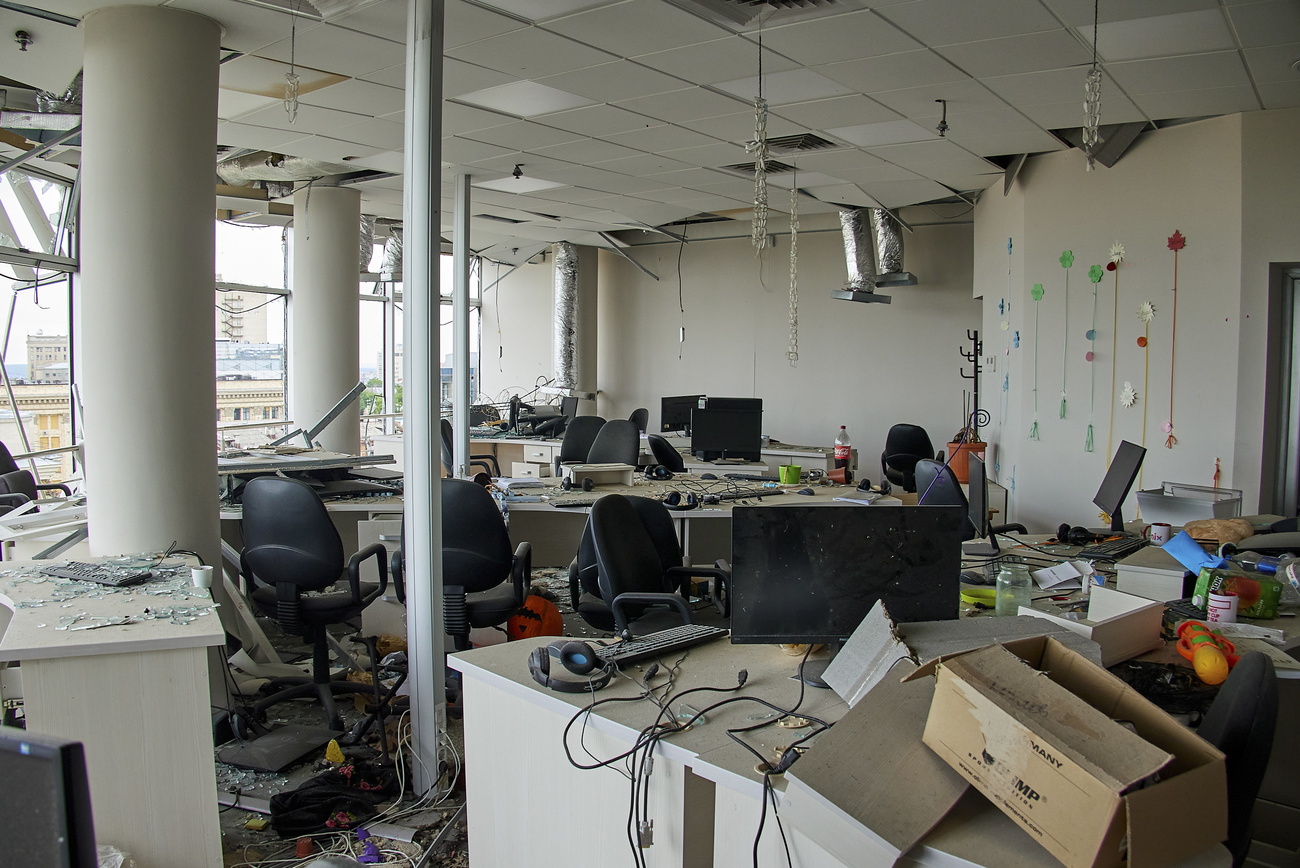
Amid the bombs, Ukraine stays open for business

Bomb shelters, blackouts, curfews, staff on the front line: these are the conditions facing companies in Ukraine. But a Swiss-based business promotion agency insists that foreign companies can still make profits in the war-torn market in the long run.
The Global Business for Ukraine (GB4U) association was set up in Switzerland in September to attract private sector investment that can help rebuild the country’s economy.
“Even in the current circumstances, companies can survive and do business. The vast majority are at least partially operational. They remain positive about the future of the Ukrainian economy,” GB4U co-founder Anna Derevyanko told SWI swissinfo.ch.
Ukraine has been at conflict with Russia since the 2014 illegal annexation of Crimea. Companies like Swiss food manufacturer Nestlé had contingency plans in place for an escalation of violence. But on February 24, the day Russia invaded Ukraine “we were not ready for a full-scale invasion”, Nestlè’s regional head Alessandro Zanelli told a GB4U meeting in Zurich in December.

More
Swiss companies ‘trapped’ in Russia
The shock of the invasion forced Nestlé to close all three of its factories in Ukraine; two in the west of the country re-opened within days. A third factory, producing instant noodle products in the eastern city of Kharkiv, remains shut as it is on the front line.
New factory in Ukraine
Nestlé recently announced that it will build a new CHF40 million (CHF43 million) factory to replace this lost production by 2024. The company produces a range of foodstuffs in Ukraine, including noodles, sauces, soups, confectionary and coffee.
The reality of war has transformed the company’s operations. “Planning, production and supplying is an art at the moment, not a science,” said Zanelli. “We have to find creative solutions to new problems from day-to-day.”
This includes building bomb shelters in factories based on a design from the company’s plant in Israel. Back-office staff, such as marketing, have been redeployed to helping colleagues relocate or on safety projects. Redundant offices have been converted into temporary accommodation for displaced employees. And electricity supply is now backed up by generators at factories.
Of Nestlé’s 5,850 employees in Ukraine, 155 are fighting Russian forces, 700 have relocated abroad and around 70% of staff in Ukraine have been displaced from their homes.
But the company remains profitable in Ukraine, despite a 15% decline in sales volumes and shrinking margins caused by safety costs.
Ukrainian national Vladimir Liulka was also shocked by Russia’s invasion of his country when he heard the news in Switzerland, where he co-founded the canton Zug Blocksport start-up in 2019. Blocksport advises sporting clubs on blockchain digital strategies and employs around 20 staff members, some of them working in Ukraine.
Bomb shelter business
Originally from Mariupol, Liulka was initially concerned about securing the safety of his staff and with successfully locating his father who was temporarily missing in Mariupol, which saw some of the heaviest early fighting.
But business operations were soon resumed at Blocksport’s research and development department based in Ukraine. “I am amazed at the courage and resilience of our employees who deliver on projects from bomb shelters,” he said.
One employee lost a foot when he stepped on a Russian landmine, Liulka told the GB4U Zurich event. He called on Swiss companies to help Ukraine by employing Ukrainian staff.
Swiss management consulting company Alvicus said the war has not disrupted access to high-grade IT developers, which the firm contracts in Ukraine for project work. “We found that the best way to help was to give them more work. They continue to deliver on projects,” said Alvicus managing partner Manuel Eppert.

More
The end of an era: Russia after Swiss watchmakers said goodbye
The GB4U business promotion agency, which is supported by the European Business Association, was first mooted at the World Economic Forum conference in Davos in May and was given further impetus by the Ukraine Recovery Conference, hosted in Lugano in July.
GB4U chose to headquarter in Switzerland to take advantage of the Alpine nation’s stability, political neutrality and central European location.
Post-war opportunities
Derevyanko, the founder, is under no illusions about the problems still facing companies operating in Ukraine. Russia still occupies large swathes of the country and has targeted energy infrastructure in a spate of recent drone attacks as the winter sets in.
There are various estimates for the cost of rebuilding Ukraine after the war, but most calculate a bill of at least $500 billion (CHF468 billion) to repair the structural damage.
“Many companies may decide that right now is not the time to invest in Ukraine,” said Derevyanko. “But it’s necessary for businesses to start preparing now for potential future investments to rebuild Ukraine when the war has ended.”
She cites opportunities for the construction, logistics, IT, energy and telecommunications sectors plus potential future contracts from the Ukrainian military.
“There have already been many success stories of European companies setting up business in Ukraine. There will be many more business opportunities in the future.”
Correction: an earlier version of this article stated that Nestlé had resumed exports of some products from Ukraine in June. Nestlé now states that it does not export any goods from Ukraine.

In compliance with the JTI standards
More: SWI swissinfo.ch certified by the Journalism Trust Initiative




























You can find an overview of ongoing debates with our journalists here . Please join us!
If you want to start a conversation about a topic raised in this article or want to report factual errors, email us at english@swissinfo.ch.